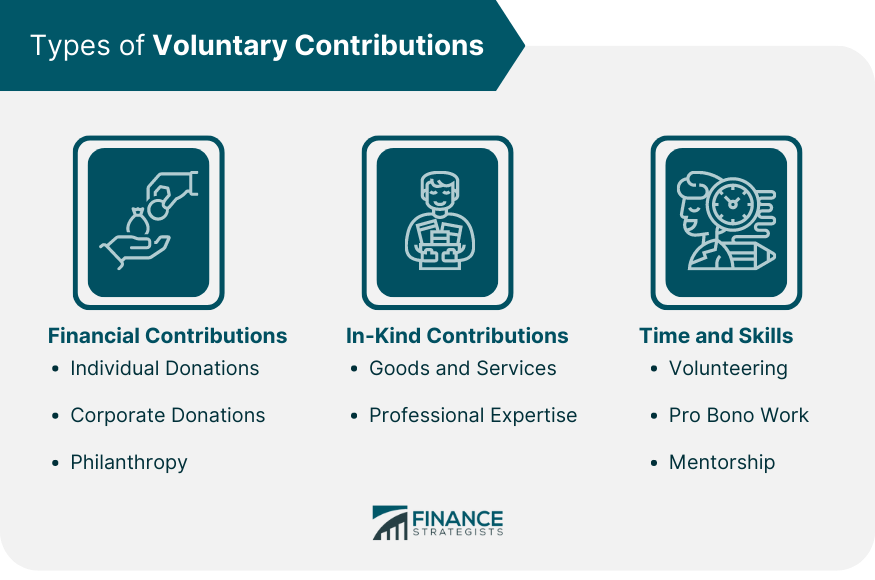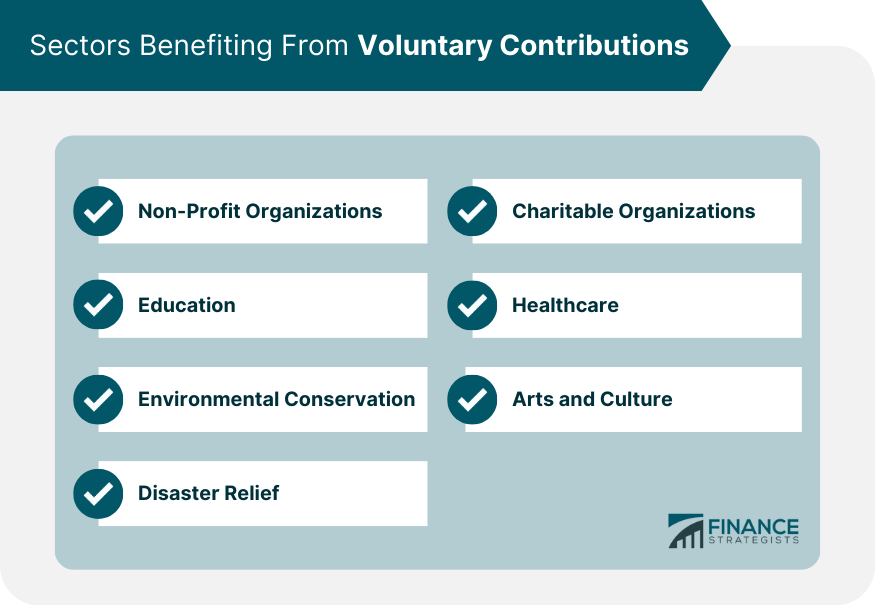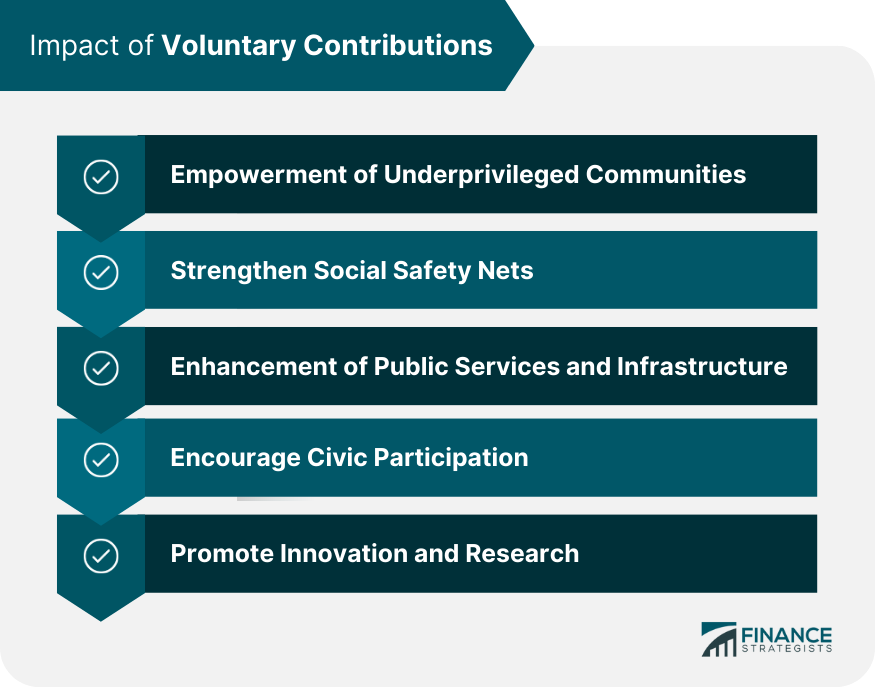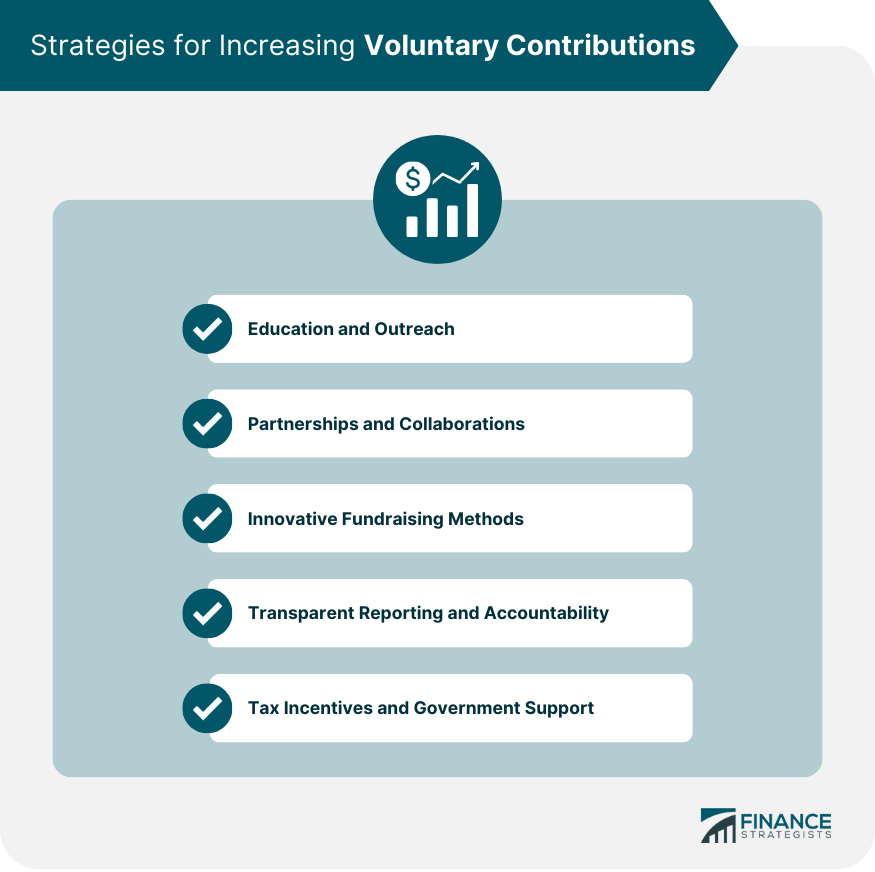Voluntary contributions refer to financial contributions made by individuals or organizations towards a particular cause or initiative without any legal obligation or expectation of return. These contributions can be made to various entities such as non-profit organizations, charities, political campaigns, or social causes. Voluntary contributions can take various forms such as donations, sponsorships, grants, and gifts. These contributions can be made in cash, assets, or services. For example, a person may donate money to a non-profit organization, sponsor a charitable event, or provide pro-bono services to a community initiative. Individuals often contribute financially to causes they are passionate about or organizations they believe in. These donations can range from small, one-time gifts to significant, recurring contributions. Companies can also make financial contributions to various causes, often as part of their Corporate Social Responsibility (CSR) programs. These donations can be in the form of direct financial support or through sponsorship of events and initiatives. Philanthropy refers to the practice of promoting human welfare by making financial contributions to causes, often on a large scale. Philanthropists typically have significant resources at their disposal and use them to create long-lasting positive change. In-kind contributions involve donating goods or services rather than money. These can include clothing, food, or even professional services like legal or medical assistance. Individuals or companies can offer their professional expertise as a form of voluntary contribution. This can involve providing consultation, mentorship, or specialized skills to help a cause or organization. Volunteering is the act of donating one's time and effort to a cause or organization without expecting any financial compensation. This can involve working directly with people in need or supporting the administrative functions of an organization. Pro bono work refers to professional services provided for free or at a reduced rate. Lawyers, doctors, and other professionals often offer pro bono services to those who cannot afford them or to organizations that need specialized expertise. Mentorship involves sharing one's knowledge, experience, and guidance with others, often to support their personal and professional growth. Mentorship can be a powerful way to contribute to a community or cause. Non-profit organizations rely heavily on voluntary contributions to support their programs and services. These organizations work in various sectors, including education, healthcare, and environmental conservation. Charitable organizations, such as food banks and shelters, depend on donations and volunteers to provide essential services to those in need. Voluntary contributions play a vital role in enhancing educational opportunities and resources for students, particularly those in underprivileged communities. Healthcare facilities and organizations benefit from voluntary contributions in the form of financial support, in-kind donations, and volunteer services. Organizations focused on environmental conservation rely on voluntary contributions to fund research, conservation efforts, and public awareness campaigns. Arts and cultural institutions often rely on donations, sponsorships, and volunteers to support their programs and events. During times of crisis, voluntary contributions are critical to providing immediate relief and long-term recovery support to affected communities. Many people are motivated by a genuine desire to help others and make a positive impact on society. Contributing to a cause or organization can provide a sense of personal satisfaction and accomplishment. Voluntary contributions can foster a sense of connection and involvement within a community. In some countries, individuals and companies can receive tax deductions or credits for making voluntary contributions to eligible organizations. Companies may engage in voluntary contributions as part of their corporate social responsibility (CSR) initiatives, demonstrating their commitment to ethical practices and the well-being of society. Voluntary contributions can help provide resources, opportunities, and support to underprivileged communities, enabling them to improve their quality of life and become more self-sufficient. Voluntary contributions play a vital role in bolstering social safety nets, ensuring that vulnerable populations have access to essential services and support. Contributions from individuals and organizations can help improve public services and infrastructure, particularly in areas where government funding is insufficient. By engaging in voluntary contributions, individuals can become more active in civic life, fostering a more engaged and informed citizenry. Financial support and expertise provided through voluntary contributions can help drive innovation and research in various fields, leading to new discoveries and solutions to pressing challenges. Many people are unaware of the importance of voluntary contributions and the various ways they can get involved, making it difficult to engage potential donors and volunteers. With so many organizations and causes competing for attention and support, potential donors may become overwhelmed and disengaged. Instances of fraud or mismanagement of funds can damage the reputation of organizations and discourage future contributions. A lack of transparency and accountability in how contributions are used can lead to distrust and reluctance to support certain organizations or causes. Raising awareness about the importance of voluntary contributions and the various ways to get involved can help encourage more people to participate. Organizations can collaborate with each other and with local businesses or government entities to create joint initiatives and campaigns, expanding their reach and impact. Employing creative and engaging fundraising strategies, such as crowdfunding or social media campaigns, can help attract new donors and supporters. Organizations should prioritize transparency and accountability in their operations, ensuring that donors and volunteers know how their contributions are being used and the impact they are having. Governments can provide tax incentives for individuals and companies that engage in voluntary contributions, making it more appealing to support eligible organizations and causes. Voluntary contributions are essential for supporting various causes and initiatives, ranging from non-profit organizations to disaster relief efforts. There are different types of voluntary contributions, including financial, in-kind, and time-based contributions. Voluntary contributions have a significant impact on underprivileged communities, social safety nets, public services, and civic participation, among other areas. However, there are challenges in promoting voluntary contributions, such as donor fatigue and lack of transparency. Strategies for increasing voluntary contributions include education and outreach, partnerships and collaborations, innovative fundraising methods, transparent reporting and accountability, and tax incentives and government support. By implementing these strategies, individuals and organizations can work together to promote voluntary contributions and create a better society.What Are Voluntary Contributions?
Types of Voluntary Contributions

Financial Contributions
Individual Donations
Corporate Donations
Philanthropy
In-Kind Contributions
Goods and Services
Professional Expertise
Time and Skills
Volunteering
Pro Bono Work
Mentorship
Sectors Benefiting From Voluntary Contributions

Non-Profit Organizations
Charitable Organizations
Education
Healthcare
Environmental Conservation
Arts and Culture
Disaster Relief
Motivations for Making Voluntary Contributions
Altruism
Personal Fulfillment
Community Involvement
Tax Incentives
Corporate Social Responsibility
Impact of Voluntary Contributions

Empowerment of Underprivileged Communities
Strengthening Social Safety Nets
Enhancing Public Services and Infrastructure
Encouraging Civic Participation
Promoting Innovation and Research
Challenges in Promoting Voluntary Contributions
Limited Awareness and Understanding
Donor Fatigue
Misuse of Funds and Resources
Lack of Transparency and Accountability
Strategies for Increasing Voluntary Contributions

Education and Outreach
Partnerships and Collaborations
Innovative Fundraising Methods
Transparent Reporting and Accountability
Tax Incentives and Government Support
Conclusion
Voluntary Contributions FAQs
The main types of voluntary contributions include financial contributions (individual donations, corporate donations, and philanthropy), in-kind contributions (goods, services, and professional expertise), and the donation of time and skills (volunteering, pro bono work, and mentorship).
Voluntary contributions provide non-profit organizations with essential funding, goods, services, and expertise, enabling them to carry out their missions and support various causes, such as education, healthcare, and environmental conservation.
People are motivated to make voluntary contributions for various reasons, including altruism, personal fulfillment, community involvement, tax incentives, and corporate social responsibility.
Some challenges in promoting voluntary contributions include limited awareness and understanding, donor fatigue, misuse of funds and resources, and a lack of transparency and accountability.
Strategies for increasing voluntary contributions include education and outreach, partnerships and collaborations, innovative fundraising methods, transparent reporting and accountability, and tax incentives and government support.
True Tamplin is a published author, public speaker, CEO of UpDigital, and founder of Finance Strategists.
True is a Certified Educator in Personal Finance (CEPF®), author of The Handy Financial Ratios Guide, a member of the Society for Advancing Business Editing and Writing, contributes to his financial education site, Finance Strategists, and has spoken to various financial communities such as the CFA Institute, as well as university students like his Alma mater, Biola University, where he received a bachelor of science in business and data analytics.
To learn more about True, visit his personal website or view his author profiles on Amazon, Nasdaq and Forbes.















